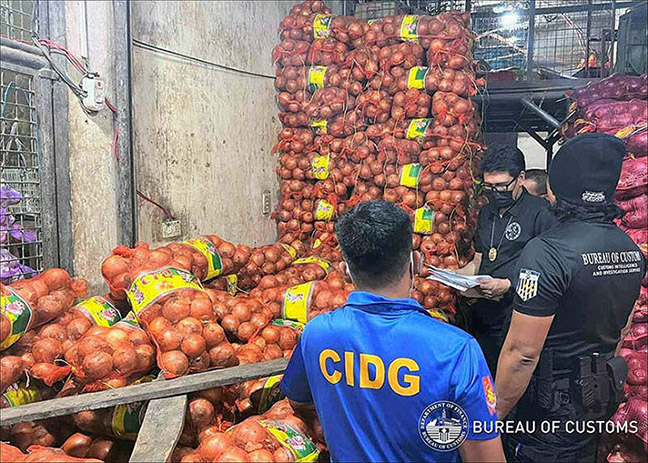
-
Congress is expected to approve the bill that defines the crime of agricultural economic sabotage and its penalties by end of June
-
The Anti-Agricultural Economic Sabotage Act is part of the streamlined list of priority bills targeted for passage by the Legislative-Executive Development Advisory Council
-
Senate President Juan Miguel Zubiri committed to pass all the priority bills “by June before the Senate break or sine die break”
Congress is expected to approve the bill that defines the crime of agricultural economic sabotage and its penalties by the end of June.
The Anti-Agricultural Economic Sabotage Act is part of the streamlined list of priority bills targeted for passage by the Legislative-Executive Development Advisory Council (LEDAC).
Senate President Juan Miguel Zubiri, during a LEDAC meeting on March 19, committed to pass all the priority bills “by June before the Senate break or sine die break,” noting that many of the priority bills are already at the “final stages,” either with the bicameral conference committee or up for President Ferdinand Marcos, Jr.’s signature.
House Speaker Martin Romualdez, for his part, said all LEDAC priority measures have already been passed by the Lower House and transmitted to the Senate.
The Lower House on September 27, 2023 approved on third and final reading House Bill (HB) No. 9284 while the Senate on December 11, 2023 gave its final approval to Senate Bill (SB) No. 2432.
READ: Senate approves on 3rd reading agri economic sabotage bill
HB 9284, or the Agri-fishery Commodities and Tobacco Economic Sabotage Act of 2023, classifies smuggling of rice and other agricultural products as economic sabotage and is punishable by life imprisonment. It amends various sections of Republic Act (RA) No. 10845, or the Anti-Agricultural Smuggling Act of 2016, which declares large-scale agricultural smuggling as an act of economic sabotage and levies heftier penalties against violators
SB 2432, meanwhile, will repeal RA No. 10845, and will be known as the Anti-Agricultural Economic Sabotage Act. It aims to promote the productivity of the agriculture sector and to protect farmers and fisherfolk from unscrupulous traders and importers and ensure reasonable and affordable prices of agricultural and fishery products for consumers.
Under SB 2432, the penalty of life imprisonment and a fine thrice the value of the agricultural and fishery products subject of the crime as economic sabotage will be imposed on any person who commits any of the prohibited acts under the proposed bill.
Under SB 2432, smuggling is defined as the fraudulent act of importing or bringing into the country agricultural and fishery products, or the act of assisting in receiving, concealing, buying, selling, disposing, storing or transporting such products, with full knowledge that the same have been fraudulently imported.
The crime of agricultural smuggling as economic sabotage is committed when the value of each, or a combination of, agricultural and fishery products smuggled by a person is at least P3 million computed using the daily price index, at the time the crime was committed.
Under HB 9284, the crime of large-scale agri-fishery commodities or tobacco smuggling is considered as economic sabotage when it involves smuggling of such products with a minimum aggregate fair market value of P1 million or involving tobacco with a minimum excise tax and value-added tax payable in the amount of P1 million.
In comparison with RA 10845, economic sabotage is defined as large-scale agricultural smuggling of at least P1 million worth of sugar, corn, pork, poultry, garlic, onion, carrot, fish, and cruciferous vegetables which are in their raw state or have undergone simple preparation or preservation for the market. For rice, the minimum amount to be considered as economic sabotage is P10 million, as valued by the Bureau of Customs (BOC).
Agricultural smuggling is committed through importation of agricultural and fishery products without an import permit/clearance from the regulatory agencies; when the import permits/clearances are used by persons other than those specifically named in the permit; and when fake, fictitious, or fraudulent import permits or shipping documents are used.
Also covered in the regulation is the selling, lending, leasing, assigning, consenting or allowing the use of import clearance of corporations, non-government organizations (NGO), associations, cooperatives, partnerships, or single proprietorships by other persons.
Agricultural smuggling is carried out when entities misclassify, undervalue, or misdeclare in filing the import entry and revenue statement with the BOC in order to evade the payment of rightful taxes and duties due to the government; and when entities organize or use dummy corporations, NGOs, associations, cooperatives, or single proprietorships to acquire these import permits.
An Anti-Agricultural Economic Sabotage Council under SB 2432 and Anti Agri-fishery Commodities and Tobacco Economic Sabotage Council, under HB 9284, will be created to ensure the proper and effective implementation of the provisions of the proposed measure.




